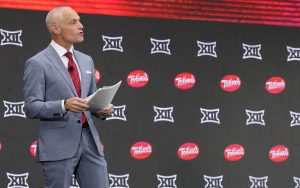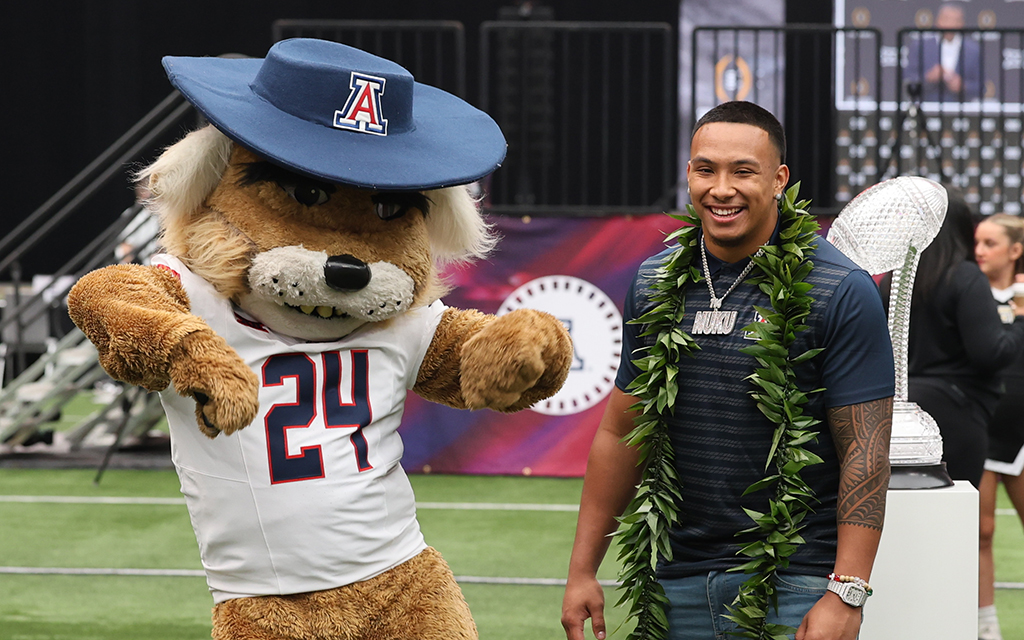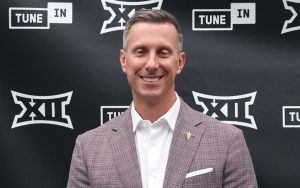


As Arizona State transitions to the Big 12, logistical challenges loom for the equipment staff, with longer drives to games, some even on the East Coast. (File photo by William Wilson/Cronkite News)
LAS VEGAS – University of Arizona linebacker Jacob Manu plans to rely more heavily on his counselor this year. The prudent approach stems from the increased travel responsibility he will endure this upcoming college football season and the possible academic challenges that may arise.
Arizona, Arizona State University, the University of Utah and the University of Colorado will make their Big 12 Conference debut this upcoming football season. As a result, schools like Arizona and ASU now face more frequent travel outside the West Coast, including games against teams as far as the University of Central Florida.
The shift to new time zones brings challenges such as altered assignment submission deadlines and possibly reduced cognitive function among players due to jet lag. These factors generate concern about the athletes’ ability to maintain full focus on their education.
“Yeah, there might be some challenges academically,” Manu said Wednesday. “Just being so busy with football and having to travel with different time changes might be difficult.”

Big 12 Commissioner Brett Yormark discusses efforts to balance competitive scheduling with athletes’ academic needs as new schools join the conference. (Photo by Joshua Heron/Cronkite News)
Big 12 commissioner Brett Yormark acknowledged the potential difficulties that more traveling may cause on an athlete’s academic pursuits and plans to set parameters to ensure their education remains paramount.
“Student-athletes travel, and inconveniences and the challenges that come with it are certainly something that we are considering,” Yormark said. “When you look at our scheduling matrix, it’s a big part of it. How do we reduce travel in ways we can and maintain the right rivalries and competitive spirit of the conference? It’s a balancing act. We are not always going to be perfect but we are trying to make sure that that is a key component in any decision we are making.”
Arizona is scheduled next season for a road game against the University of Central Florida, which is more than 2,100 miles from Tucson by equipment truck and one of three matchups way from the West Coast. First-year Arizona coach Brent Brennan trusts his school’s staff to assist students when academic struggles may arise due to travel.
“We have incredible academic support,” Brennan said. “And as a coaching staff, we are very serious about supporting the academic mission of our university.”
While ASU won’t travel to Florida, the Sun Devils travel outside the West Coast five times this upcoming season compared to zero last year. They will play on the road against Texas Tech, Texas State, Cincinnati, Oklahoma State and Kansas State.
ASU athletic director Graham Rossini says preparation before travel is critical to ensure players can focus on their schoolwork, adding that the adjustment for the university won’t be difficult, but instead, “different than what we’re used to.” He says the distance traveled doesn’t change but acknowledges the time zone shift and believes the onus to take care of the athletes rests not only on the coaching staff.

University of Arizona linebacker Jacob Manu speaks to reporters in Las Vegas about the academic challenges of increased travel in the Big 12 Conference. (Photo by Joshua Heron/Cronkite News)
“We’re tapping into our sports medicine team, our sports performance team, our nutrition team,” Rossini said. “And there are things that we can do ahead of a trip to make sure that we’re focused on peak performance and recovery, knowing that their student-athletes have demands on their time and academic expectations.”
Rossini recognizes the importance of asking practical questions when traveling across time zones to guarantee the players meet their academic expectations.
“And so how we travel, the time that we leave. Do we need to add an extra day on the particular road trips, depending on where we’re traveling? All that enters the conversations as we know that traveling the Big 12 will be a little bit different,” Rossini said. “And so, looking at all that, what do we do for meals pre-trip, on the trip, when we land? How do we find a responsible away to get into decent times so everybody gets a good night’s rest and is prepared to go compete?
Rossini added that the athletics department must be “mindful” of the students’ classroom expectations by ensuring they’ve got “space in the hotels” to complete exams and attend classes if needed.
“The student athlete’s well-being and experience are very much front and center of how we make decisions,” Rossini said.

ASU athletic director Graham Rossini outlines strategies to support athletes’ academic performance during increased cross-country travel in the school’s move to the Big 12. (Photo by Joshua Heron/Cronkite News)
The National Football Foundation is a non-profit focused on spreading the importance of academics among amateur football players. NFF chief operating officer Matthew Sign places the onus on each university to provide necessary markers for students to thrive academically but maintains confidence in the schools’ collective plan.
“For the most part, especially as you move up the ladder, those schools do a really good job of trying to prepare the young men for what’s going to happen,” Sign said. “From what we see and what we hear … they’re all working on this, and I think they all have a good plan for it. Is it going to be difficult? Yes. But everyone’s just going to have to adapt.”
ASU defensive back Xavion Alford believes the time difference presents a new academic obstacle for athletes, but his advice to all players is simple: “Don’t procrastinate.”
“You (athletes) know you have practice from Thursdays on. It kind of gets real in the week,” Alford said. “Take care of your work on the weekends before, like Sundays, use days like that. Use the beginning of the week to knock out your work so you can focus on just the game throughout the end of the week.”
For Alford, business is business no matter the zone, and no matter if it’s on the field or in the classroom.
“There’s time differences everywhere, you still got to get the job done,” he said. “We just got to prepare as much as we can for the time zone, but at the end of the day, we still have a job to do.”